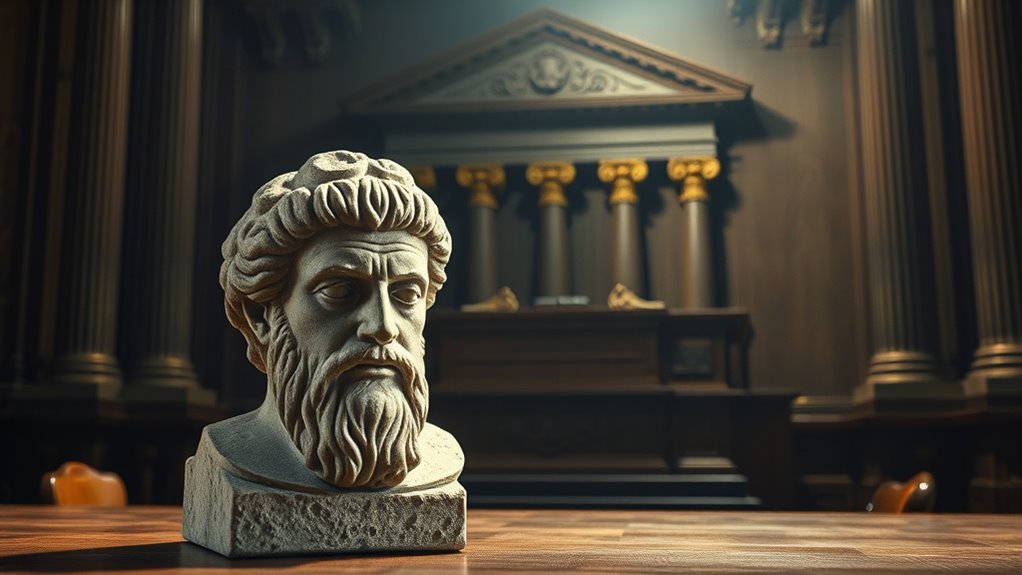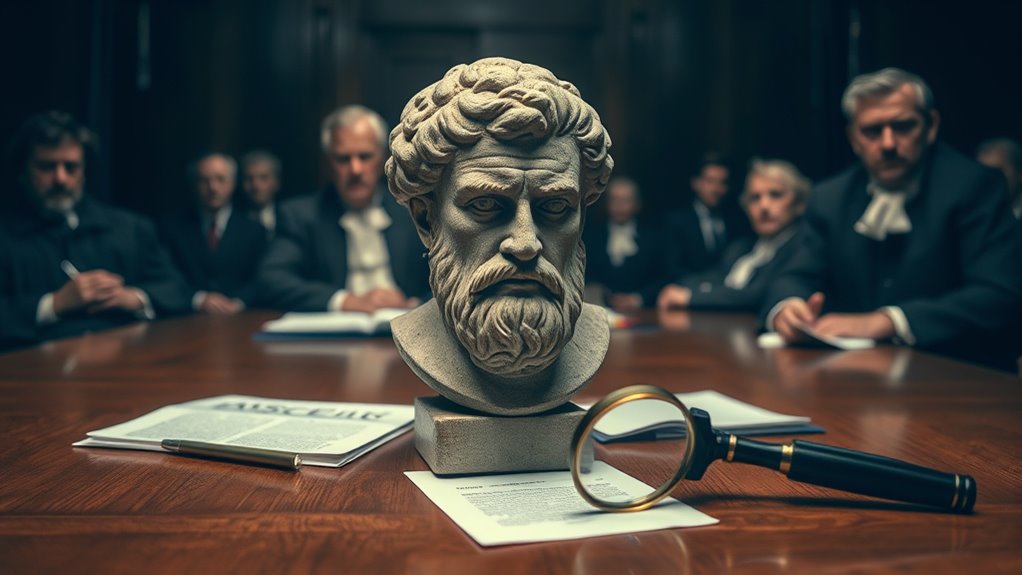Skepticism’s roots in ancient Greece, led by thinkers like Socrates and classical skeptics, have profoundly influenced today’s legal standards. It emphasizes questioning claims through evidence and rational inquiry before accepting them as truth. In courts, this legacy appears as the principle of “beyond a reasonable doubt,” requiring strong proof to prevent wrongful judgments. If you want to understand how these ancient doubts continue shaping justice today, explore how skepticism remains an crucial part of legal reasoning.
Key Takeaways
- Ancient skeptics laid the foundation for evidence-based reasoning used in modern legal systems.
- Their emphasis on questioning assumptions influences standards like “beyond a reasonable doubt.”
- Skepticism promotes rigorous scrutiny of claims, ensuring legal judgments are supported by observable proof.
- The legacy fosters integrity and rational inquiry in courts, preventing acceptance of unverified assertions.
- Modern law’s reliance on empirical evidence reflects the enduring impact of ancient philosophical doubt.

Skepticism has long served as a crucial check on claims that lack evidence, but in today’s polarized environment, it often faces harsh criticism. When you approach assertions with doubt, you’re engaging in a tradition rooted in the pursuit of truth, relying on empirical evidence and philosophical doubt to challenge assumptions. Ancient doubters, like Socrates and the skeptics of classical Greece, laid the groundwork for this skeptical stance by insisting that beliefs must be scrutinized through reason and evidence before accepting them as true. They believed that genuine knowledge required more than mere opinion or tradition; it demanded observable, measurable proof. This emphasis on empirical evidence became a cornerstone of philosophical doubt, a method that questions the very foundations of what we accept as truth.
In the legal context, skepticism takes on a tangible form. Courts rely heavily on evidence-based reasoning, demanding concrete proof before rendering judgments. You’re expected to scrutinize claims, weigh the credibility of witnesses, and demand empirical evidence to substantiate allegations. This tradition echoes the ancient skepticism that prioritized verified facts over assumptions and hearsay. When a judge or jury applies skepticism, they’re not dismissing ideas outright but demanding they stand up to rigorous examination. This process ensures that verdicts are grounded in factual certainty rather than bias or conjecture, reinforcing the legal system’s integrity.
Moreover, the legacy of ancient doubters influences modern legal standards like “beyond a reasonable doubt.” Such standards embody a skeptical approach, requiring proof so convincing that doubt is eliminated. This echoes philosophical doubt, where certainty is elusive, but a high degree of confidence can be achieved through solid evidence. In this way, skepticism isn’t about dismissing every claim but about carefully evaluating its evidentiary support. It’s a safeguard against wrongful convictions and baseless accusations, emphasizing that beliefs should rest on demonstrable proof rather than assumptions or unverified beliefs.
Understanding the legacy of these ancient skeptics helps you appreciate how skepticism evolved from philosophical doubt to a vital component of legal reasoning. It’s a method that keeps systems honest by insisting on empirical evidence, whether in courts or in everyday decision-making. The importance of skepticism lies in its ability to prevent you from accepting claims at face value, urging you to seek proof, question assumptions, and uphold the principles of rational inquiry. This tradition, rooted in ancient philosophy, continues to serve as a vital check on human claims, ensuring that belief and justice are based on evidence rather than unexamined faith or prejudice. Recognizing evidence-based reasoning as a fundamental aspect of skepticism highlights its enduring influence across various domains.
Frequently Asked Questions
How Did Ancient Skeptics Influence Modern Scientific Methods?
You see, ancient skeptics shaped modern scientific methods by emphasizing empirical inquiry and critical thinking. They encouraged questioning assumptions, testing ideas through evidence, and avoiding dogma. These principles form the backbone of science today, helping you analyze data objectively and challenge existing beliefs. Their legacy teaches you to approach problems with an open mind, constantly seeking proof and refining theories, which is essential for progress in scientific discovery.
Are There Any Famous Court Cases Involving Philosophical Skepticism?
Did you know there’s no famous court case directly involving philosophical skepticism? In legal debates and court proceedings, skepticism influences how evidence is evaluated, but no landmark trial specifically centered on skepticism itself. Instead, courts often face debates about truth and certainty, echoing skeptical questions. While skepticism shapes legal reasoning subtly, it hasn’t triggered a notable court case on its own, making it more of an underpinning than a headline-maker.
What Legal Principles Originated From Ancient Doubters’ Arguments?
You might not realize it, but ancient doubters influenced legal principles like the burden of proof and presumption of innocence. Their skepticism encouraged courts to require evidence before convicting, ensuring the accused is presumed innocent until proven guilty. These ideas help protect individual rights and promote fairness in justice systems today, showing how philosophical skepticism laid the groundwork for key legal standards still in use.
How Did Skepticism Challenge Religious Authority in Ancient Times?
Imagine questioning a king’s decree and watching his face tighten—that’s how skepticism challenged religious authority. In ancient times, faith critique by skeptics like Socrates sparked debates that questioned divine authority, encouraging critical thinking. You see, their doubts challenged the unquestioned power of religious leaders, fostering a culture of inquiry. This authority challenge led to broader discussions about truth and belief, shaping the foundations of modern skepticism and legal principles.
Who Were the Most Influential Skeptics in Legal History?
You should explore influential skeptics in legal history who shaped skeptical jurisprudence and emphasized legal doubt. Think of figures like Cicero, who questioned legal authority, and Sir William Blackstone, who promoted critical legal thinking. These skeptics challenged unquestioned norms, encouraging courts to contemplate different perspectives. Their contributions fostered a legal environment where doubt and questioning became essential, ultimately strengthening justice through critical analysis and fostering a more nuanced understanding of law.
Conclusion
As you reflect on the legacy of ancient doubters, it’s almost as if their questions were waiting silently for you to ask them today. Their skepticism, once seen as rebellion, now shapes your pursuit of truth. Maybe, just maybe, the same doubts that once challenged the past are quietly guiding your quest for certainty. Like a coin flipping in the air, their legacy lands softly in your hands, reminding you that doubt is the seed of understanding.









